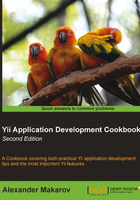
上QQ阅读APP看书,第一时间看更新
Using a base controller
In many frameworks, the concept of a base controller that is being extended by other ones is described right in the guide. In Yii, it is not in the guide as you can achieve flexibility in many other ways. Still, using a base controller is possible and can be useful.
Getting ready
We are going to set up a new application using yiic webapp.
Let's say we want to add some controllers that will be accessible only when the user is logged in. We can surely set this constraint for each controller separately, but we will do it in a better way.
How to do it...
- First, we will need a base controller that our user-only controllers will use. Let's create
SecureController.phpin theprotected/componentsdirectory with the following code:<?php class SecureController extends Controller { public function filters() { return array( 'accessControl', ); } public function accessRules() { return array( array('allow', 'users'=>array('@'), ), array('deny', 'users'=>array('*'), ), ); } } - Now, go to the Gii controller generator and enter
SecureControllerinto the Base Class field. You will get something like this:class TestController extends SecureController { public function actionIndex() { $this->render('index'); } … } - Now, your
TestControllerindex will be only accessible if the user is logged in, even though we have not declared it explicitly in theTestControllerclass. You can check it by visiting/index.php?r=test/indexwhile not being logged in.
How it works...
The trick is nothing more than a basic class inheritance. If filters or accessRules is not found in TestController, then it will be called from SecureController.